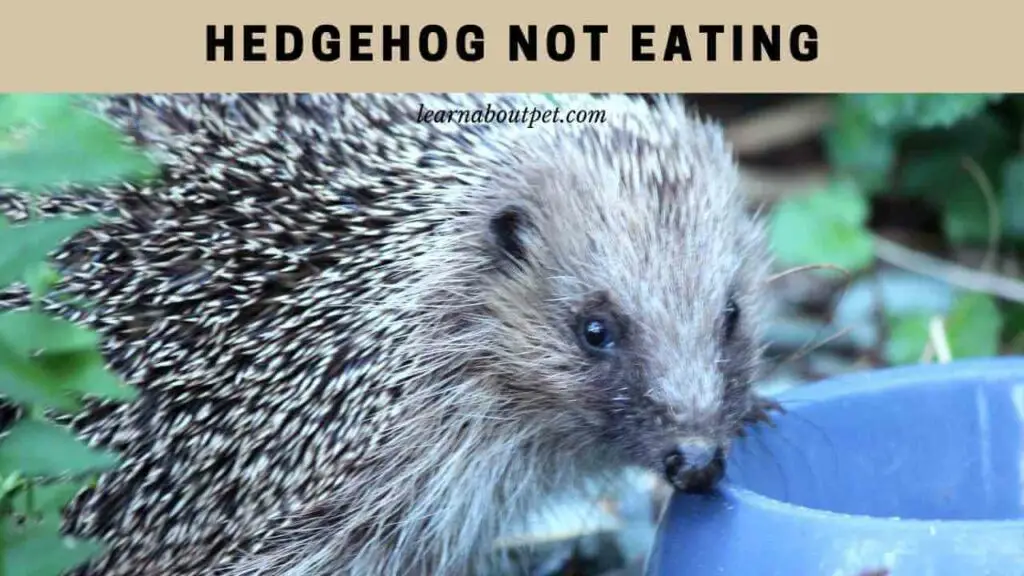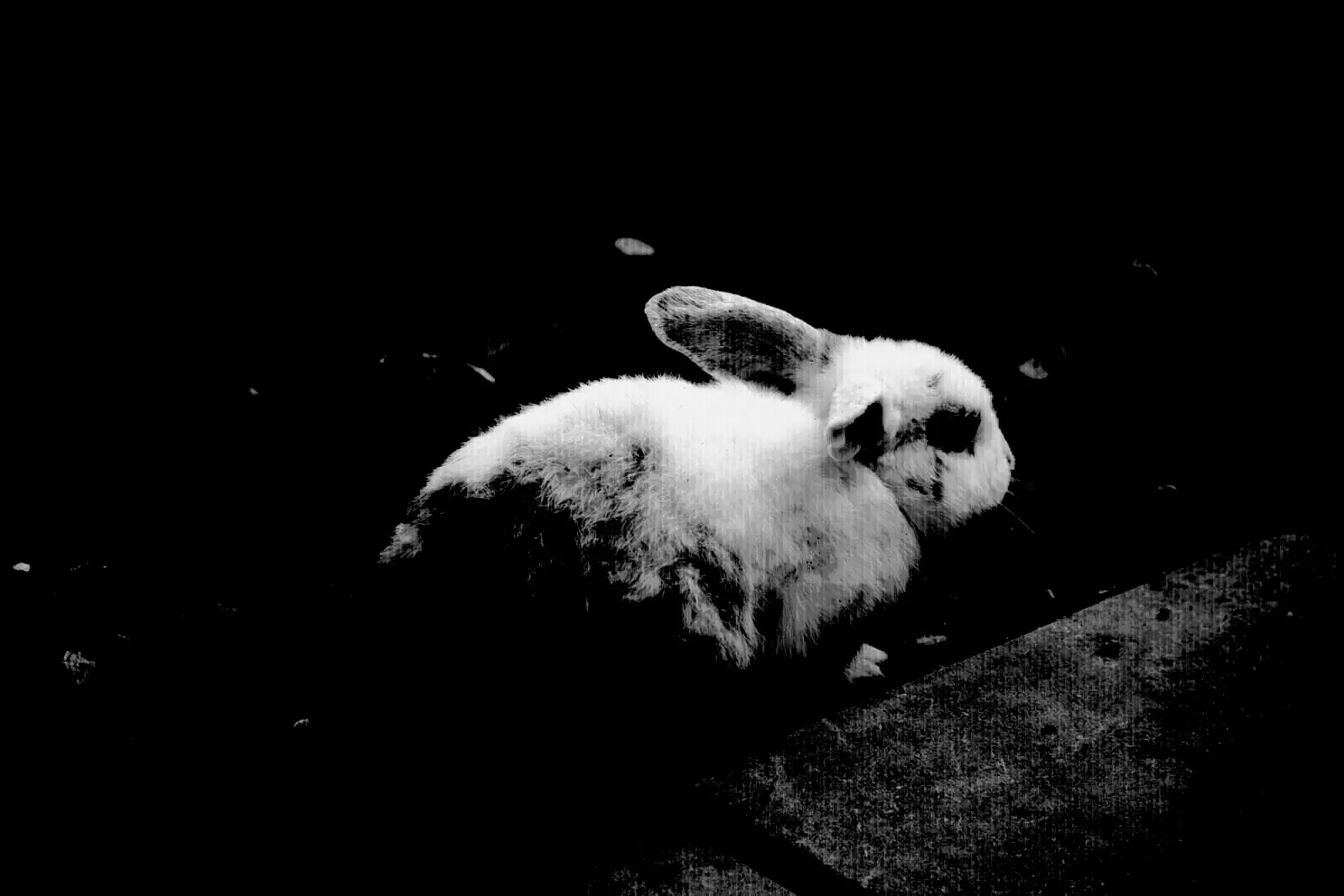If you keep a hedgehog as a pet, there are times when you may notice that it is not eating. This can cause you a great deal of distress, as you try to figure out what may have gone wrong. In this article, you will find information on the common reasons for these animals not eating. You will also find information on what to do about a hedgehog that won’t eat.
What could be the possible reasons for hedgehog not eating? In some cases, it can be due to stress. There are also cases where it is due to illness, parasites, dental problems or dehydration. A hedgehog may also not eat if it is provided with poor quality food or if hedgehog is in a new environment.
We also have cases that hedgehogs that are about to go into hibernation mode (or that are coming out of hibernation mode) may not eat.

Sometimes, to get the hedgehog eating again, all you have to do is change the food. At other times, you may just need to change when and/or how you present the food. But there are also times when you need to take the hedgehog to a vet. The vet then treats any underlying medical conditions, in order to get the hedgehog eating again.
Why Is My Hedgehog Not Eating?
One possible reason for your hedgehog not eating may be that he is in a new environment. When a hedgehog is in a new place, it will normally not eat for the first few days, as it acclimatizes.
Another possible reason for your hedgehog not wanting to eat may be stress. This stress may be on account of loud noises (especially if those are new loud voices that were previously not there). The stress may also be due to confinement in a cage that is too small, or even due to cold drafts. Stress often makes hedgehogs stop eating.
Yet another possible reason for your hedgehog not wanting to eat may be because you are giving it unpalatable food. Or it could be that you are presenting the food in a manner that makes it hard to access for the hedgehog.
If your hedgehog is sick, one of the symptoms may be loss of appetite. So this is another thing that can make a hedgehog not eat. The sickness may be an infection. Or it may be a physiological one: like where there is a blockage or another issue in the digestive tract.
Some hedgehog species, typically those that originate from temperate climates, go into hibernation mode. A hedgehog going into that mode, or coming out of that mode, may not eat for quite some time. But in captivity, if you provide ideal temperature conditions, there may not be a reason for your hedgehog to hibernate
Dental issues can make a hedgehog not eat. Even dehydration is known to at times make hedgehogs not eat.
Therefore if you have been trying to figure out why is my hedgehog not eating, those are the key possibilities to consider.
Why Is My Hedgehog Not Eating As Much?
You may have a situation where your hedgehog is not eating as much as it used to do. So it is still eating, but not as much. This too can be cause for concern. But sometimes, the reason behind it is benign. It may be a case of an old hedgehog not eating as much as it used to eat while young. But this would be understandable, given that younger hedgehogs require more food (to fuel growth) than older ones. Therefore it is quite normal for old hedgehogs not eating as much as younger ones.
Then again, a hedgehog eating less than it usually does may be a sign of illness. Indeed, if you carry out a search on what are the signs of a sick hedgehog, you notice that loss of appetite is one of them. Worse still, this can be one of the hedgehog dying signs. But much depends on what other symptoms the hedgehog has, besides not eating. For instance, if you have a hedgehog not eating losing weight consistently for a number of months, it can be a sign of a serious illness.
If you have changed the food you provide the hedgehog, this may cause him not to eat as much. For instance, if you have a case of a hedgehog not eating mealworms, and the meal worms are a new food to him, this may be the reason. Or if there is a change to how or when you provide food to the hedgehog, this may cause it not to eat as much.
The hedgehog may have developed dental problems that make eating a pain to him. Or there may be something stressing it out.
All these things can make a hedgehog that used to eat much start eating less.
Why Is My Hedgehog Not Eating Or Drinking?
If it is a newly acquired hedgehog, this may be normal. It takes a while for a hedgehog that is a new place to get used to the place to a point where it can start eating there. Therefore if it is a new hedgehog not eating or more specifically a rescue hedgehog not eating, this may be the reason.
It may also be that the hedgehog is sick. Perhaps, due to dehydration, the hedgehog has constipation that is having a bad effect on its appetite. Or there could be a blockage in the hedgehog’s digestive tract. This possibility is more likely if, for instance, you have a hedgehog not eating and lethargic. The digestive tract blockage possibility may be stronger where you have a hedgehog not eating or pooping.
On another note, if the hedgehog is experiencing trauma, this may cause it not to eat or drink. The trauma may be physical: for instance, following a surgical procedure. Thus, if you have a hedgehog not eating after surgery, this may be the reason. Or the trauma may be mental. This is for instance if the hedgehog is in a cage that is too small. So this may be the possible reason for your pet hedgehog not eating.
Sometimes, hedgehog not eating or drinking may be a manifestation of wobbly hedgehog syndrome.
Then again, it may be that the hedgehog is about to go into hibernation mode. Or it is coming out of hibernation mode. But this possibility only applies for certain species, under certain conditions. If, for instance, it is a case of an African pygmy hedgehog not eating or drinking, the hibernation possibility may not come into play.
How Long Can A Hedgehog Go Without Eating?
One day is probably the longest a hedgehog can safely go without eating. Due to their fast metabolisms, these animals get fatty liver disease when they go for too long without eating. And in this case, ‘too long’ can mean just 3 days.
The fatty liver disease may manifest, for instance, through a hedgehog green poop not eating. So, it is ideal to ensure that your hedgehog doesn’t go for more than 24 hours without eating. By the lapse of 72 hours, the consequences may be very dire.
Hedgehog Not Eating Or Moving – What Are The Possible Reasons?
If you have a case of a hedgehog not eating or moving, it may be a sign of serious illness. Or it may be that the hedgehog is in hibernation mode. Much of course depends on the extent to which the hedgehog is not moving.
Sometimes, you may have a case of a hedgehog not eating or running, but still managing to move slightly. This is very different from a scenario where you have a hedgehog not eating or drinking, and not moving even slightly.
Where it is not due to illness or hibernation, it may be on account of severe dehydration. Or the hedgehog may be having a very severe internal parasite infestation.

Hedgehog Not Eating Or Pooping – What Are The Possible Reasons?
One possibility is that the hedgehog may be having some sort of digestive tract blockage. Another possibility is that hedgehog has some sort of other illness that depresses its appetite, leading to it not eating: which in turn leaves it with nothing to poop.
This may be the possibility in the case of a mother hedgehog not eating (yet we would ordinarily expect a mother hedgehog to have a voracious appetite in order to meet lactating needs).
Another possible reason is dehydration. Dehydration depresses the hedgehog’s appetite. Because the hedgehog has no appetite, it won’t eat. And because it won’t eat, then it has nothing to poop. Even severe dental problems can cause a hedgehog not to eat (and therefore not to have anything to poop).
Stress is yet another possibility. Very severe stress can cause a hedgehog to completely stop feeding. It may manifest through behavioral changes: for instance, with a hedgehog not sleeping in house and not eating at all. In the worst case scenario, it can lead to complete loss of appetite. This means that the hedgehog doesn’t eat, and therefore doesn’t have anything to poop.
If your hedgehog goes into hibernation mode, it may not eat or poop as well.
Hedgehog Not Eating And Lethargic – What Are The Possible Reasons?
One possibility for hedgehog not eating food and being lethargic may be sickness. For instance, if the hedgehog has an infection, it may not eat and it may also be lethargic. Similarly, if the hedgehog has a digestive tract blockage, it may not eat and may be lethargic. Or if the hedgehog has a tumor somewhere, it may not eat, and may be lethargic.
Another possibility for hedgehog not being in a position to eat and being lethargic may be dehydration.
These possibilities apply both for domestic pet hedgehogs and wild ones. Thus if you had a wild hedgehog not eating and lethargic, these would still be the possibilities to consider. And if you were trying to figure out why is my pet hedgehog not eating and it is also lethargic, these would still be the possibilities to consider.
Hedgehog Not Eating Food – What To Do?
One simple but effective strategy is that of changing the food you provide to the hedgehog. Give it something more palatable. Gradually introduce variety in the diet.
Another effective strategy is that of changing the container in which you present the food to the hedgehog.
Where the problem seems to be due to dehydration, you may consider presenting the hedgehog with distilled water, rather than ordinary tap water. Or you may consider switching from a water bottle, to presenting the water in a dish.
Where it seems to be due to an illness, you need to take the hedgehog to a vet. Once the underlying condition is treated, the hedgehog’s appetite should return.
In case the hedgehog’s loss of appetite is due to stress, you need to identify what is stress it. Then get rid of it. This may mean moving the hedgehog from a location that has too much noise, to a quieter location. Or it may mean getting a bigger cage for the hedgehog. It could also mean buying new toys for the hedgehog, to get rid of boredom and the stress that comes with it.
Where it is due to the hedgehog being in a new environment, you may have to just wait for it to acclimatize.
But there are also cases where you may have no choice, but learn how to force feed hedgehog. This is where, for instance, the idea of feeding the hedgehog using a syringe may come into play (and surprisingly, the hedgehog may like it).
What To Feed A Hedgehog That Wont Eat?
Canned turkey food is one good possibility. Insects sometimes also work wonders, as does chicken broth. Moist cat food may also be worth considering as may be cat biscuits.
There have even been cases where watered down pumpkin is taken very well by hedgehogs that otherwise wouldn’t eat. All in all, foods that tickle hedgehogs’ taste bugs and are nutritionally rich are most ideal in this situation.
Final Verdict – Hedgehog Not Eating
Is your Hedgehog not eating? There are many possible reasons for a hedgehog not eating. It may be due to the hedgehog being in a new environment, stress, illness, dental problems or internal parasites. It may also be trauma following a surgical operation or due to poor food quality.

Getting a hedgehog to start eating again may be just a matter of changing the food you give to it, or changing the way you present the food. But it may also require more elaborate measures – such as procuring treatment for any underlying illnesses or deworming. In the final analysis, if your hedgehog is not eating, and the problem is getting to worrying levels, it is best to consult a vet straightway.
As a pet lover, make sure to learn about pet more and give your pet hedgehog a good and comfortable life!

Welcome to Learn About Pet. My name is Rajkumar Ravichandran and I love all pets, travel, and amazing food. I write about my passion and personal experience caring for multiple pets in this blog! ❤️
Post Disclaimer
DISCLAIMER: THIS BLOG OR WEBSITE, "Learn About Pet", DOES NOT PROVIDE YOU WITH MEDICAL ADVICE AND IS NOT A SUBSTITUTE FOR MEDICAL ADVICE. ALWAYS GET IN TOUCH WITH YOUR PERSONAL VETERINARIAN AND USE INFORMATION HERE AS GENERAL ADVICE.
The information, including but not limited to, text, graphics, images and other material contained on this website are for informational purposes only. No material on this site is intended to be a substitute for professional veterinary advice, food recommendation, diagnosis, or treatment. Always seek the advice of your veterinarian or other qualified health care provider with any questions you may have regarding a medical condition or for pet food related questions.







